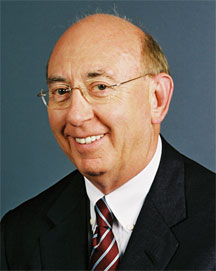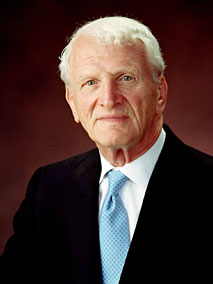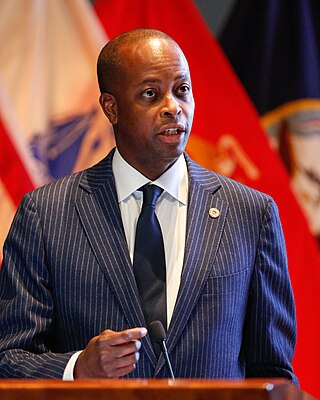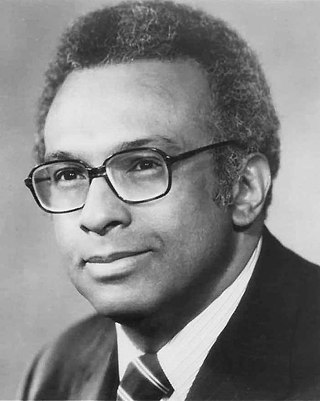
Baylor College of Medicine (BCM) is a medical school and research center in Houston, Texas, within the Texas Medical Center, the world's largest medical center. BCM is composed of four academic components: the School of Medicine, the Graduate School of Biomedical Sciences; the School of Health Professions, and the National School of Tropical Medicine.

The Fred Hutchinson Cancer Center, formerly known as the Fred Hutchinson Cancer Research Center and also known as Fred Hutch or The Hutch, is a cancer research institute established in 1975 in Seattle, Washington.

Torsten Nils Wiesel is a Swedish neurophysiologist. With David H. Hubel, he received the 1981 Nobel Prize in Physiology or Medicine, for their discoveries concerning information processing in the visual system; the prize was shared with Roger W. Sperry for his independent research on the cerebral hemispheres.
The National Cancer Institute (NCI) coordinates the United States National Cancer Program and is part of the National Institutes of Health (NIH), which is one of eleven agencies that are part of the U.S. Department of Health and Human Services. The NCI conducts and supports research, training, health information dissemination, and other activities related to the causes, prevention, diagnosis, and treatment of cancer; the supportive care of cancer patients and their families; and cancer survivorship.

Memorial Sloan Kettering Cancer Center is a cancer treatment and research institution in Manhattan in New York City. It was founded in 1884 as the New York Cancer Hospital. MSKCC is one of 72 National Cancer Institute-designated Comprehensive Cancer Centers. It had already been renamed and relocated, to its present site, when the Sloan-Kettering Institute for Cancer Research was founded in 1945, and built adjacent to the hospital. The two medical entities formally coordinated their operations in 1960, and formally merged as a single entity in 1980. Its main campus is located at 1275 York Avenue between 67th and 68th Streets in Manhattan.
The "war on cancer" is the effort to find a cure for cancer by increased research to improve the understanding of cancer biology and the development of more effective cancer treatments, such as targeted drug therapies. The aim of such efforts is to eradicate cancer as a major cause of death. The signing of the National Cancer Act of 1971 by United States president Richard Nixon is generally viewed as the beginning of this effort, though it was not described as a "war" in the legislation itself.

John E. Niederhuber, MD was the 13th director of the National Cancer Institute (NCI), from 2006 until July, 2010, succeeding Andrew von Eschenbach, who went on to become a director at biotechnology firm BioTime. A nationally renowned surgeon and researcher, Dr. Niederhuber has dedicated his four-decade career to the treatment and study of cancer - as a professor, cancer center director, National Cancer Advisory Board chair, external advisor to the NCI, grant reviewer, and laboratory investigator supported by NCI and the National Institutes of Health. He is now Executive Vice President/CEO Inova Translational Medicine Institute and Inova Health System and co-director, Johns Hopkins Clinical Research Network.
Alan D. D'Andrea is an American cancer researcher and the Fuller American Cancer Society Professor of Radiation Oncology at Harvard Medical School. D'Andrea's research at the Dana Farber Cancer Institute focuses on chromosome instability and cancer susceptibility. He is currently the director of the Center for DNA Damage and Repair and the director of the Susan F. Smith Center for Women's Cancer.

Eugene Nicholas Myers is an oncologist and otolaryngologist and a leader in the treatment of head and neck cancer. He has served on the faculty of the University of Pittsburgh School of Medicine since 1972, when he became chairman of the Department of Otolaryngology. He is the author or co-author of leading texts in the field of head and neck cancer, and has chaired and served on the boards of the preeminent societies and associations in the field.

Wayne Alix Ian Frederick is a Trinidadian-American scholar, surgeon, and university administrator. He served as president of Howard University in Washington D.C. from July 21, 2014 to August 31, 2023. Frederick also serves as the distinguished Charles R. Drew Professor of Surgery.

LaSalle Doheny Leffall Jr. was an American surgeon, oncologist, and medical educator. Recognized as very committed to those he served and his profession, he served as the Charles R. Drew Professor of Surgery at Howard University College of Medicine and in leadership positions for several healthcare organizations. He served as president of the American Cancer Society and the American College of Surgeons.
Freddie Steinmark was an American college football player, whose diagnosis of bone cancer and subsequent leg amputation during his junior year with the University of Texas Longhorns provided an inspiration for the team's national championship that year. His life has since been the subject of a number of inspirational books and a movie.
Nita Ahuja is a surgeon and the Chair of the Department of Surgery at Yale School of Medicine and Surgeon-in-Chief of Surgery at Yale New Haven Hospital. She is the first woman ever to serve as Chair of Surgery in Yale in its >200 year history. Before taking this position she was the first woman ever to be the Chief of Surgical Oncology at Johns Hopkins Hospital, Baltimore, USA. Ahuja researches in the field of epigenetics and is a passionate advocate of clinician scientist. She also served as the director of Sarcoma and peritoneal surface malignancy program. She is a surgeon-scientist and her research has been cited more than 11,000 times in scientific literature.
Patricia Kilroy Donahoe is an American pediatric surgeon and a leading researcher in the field of developmental biology and oncology. She was the president of the American Pediatric Surgical Association from 2006 to 2007. She currently serves as the director of pediatric surgical research laboratories and chief emerita of pediatric surgical services at Massachusetts General Hospital.
Matthew E. Nielsen is an American urologist oncologist and health services researcher. He is a Full professor and Chair of Urology at the UNC School of Medicine. Nielsen joined the faculty at UNC in 2009 as a urologic oncologist and health services researcher after completing medical school and residency training at Johns Hopkins.
Martha A. Zeiger is an American endocrine surgeon and scientist. She is currently Director of the Center for Cancer Research Office of Surgeon-Scientist Career Development at the National Institutes of Health (NIH). She is also an adjunct investigator in the Surgical Oncology Program at NIH's National Cancer Institute, where she previously served as director. She was the S. Hurt Watts Professor and Chair of the Department of Surgery at the University of Virginia. Prior to joining academia, Zeiger spent six years in the United States Navy as General Medical Officer, Commander and Surgeon in San Diego, Hawaii and Washington, D.C.
Beth Young Karlan is an American gynecologic oncologist. In 2008, she was named editor-in-chief of the medical journals Gynecologic Oncology and Gynecologic Oncology Reports. In 2012, Karlan was appointed by the White House to serve on the National Cancer Advisory Board, and in 2015, she was elected to the National Academy of Medicine.
Carol R. Bradford is an American otolaryngologist. She is the 15th dean of the Ohio State University College of Medicine and vice president for Health Sciences at the Ohio State University Wexner Medical Center.
Patricia L. Turner, MD, MBA, FACS is an American general surgeon. She is the first African American, and first woman to serve as executive director and Chief Executive Officer of the American College of Surgeons. Turner formally assumed the role of executive director and CEO on January 1, 2022.
Valerie W Rusch, MD, FACS, is an American thoracic surgeon who is currently the Miner Family Chair for Intrathoracic Cancers and Vice Chair for Clinical Research, Department of Surgery, at Memorial Sloan Kettering Cancer Center.







